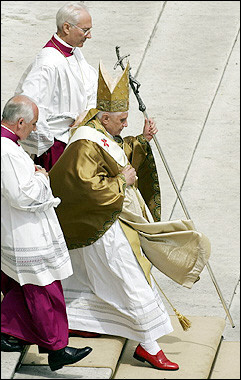- Joined
- Jul 27, 2010
- Messages
- 37,412
- Reaction score
- 13,542
- Gender
- Female
- Political Leaning
- Other
Call me old fashioned, whatever, but I gotta serious soft spot for monarchy/royalty, constitutional of course.
I enjoy the ceremonial glamor, honor, tradition, etc. A monarch exudes more strength, and inspires more pride from me, then an elected head of state does. Serving one seems cooler than serving say....Obama.
The British government model seems pretty perfect to me.
Yall?
Glamour, honor, tradition... maybe you'd like being a Catholic.
Check out Benedict rocking his prada hush puppies.


